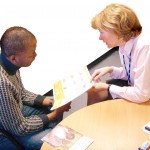
Last week we posted about some research by a self advocacy group which was looking at some of the reasons why annual health checks only happened for one in four people with learning disabilities in their area.
The researchers in this US study looked at the needs of primary care doctors using semi structured interviews which they carried out with 22 physicians who were providing health care to people with learning disabilities. They wanted to find out about the educational needs of such family doctors and did this by identifying the themes that emerged from the Interviews using tools from grounded theory.
They found, in line with many previous studies that the doctors often lacked experience with this population and that many of their patients with learning disabilities expressed dissatisfaction with the care they received. .
The grounded theory analysis identified several themes relating to educational needs including a feeling of “operating without a map,” having a personal discomfort with patients with learning disability and the expression of a need to have more exposure to and experience with people with learning disability.
Doctors in the study also express their frustration in this area and that they lacked confidence. They expressed some anxiety about potential difficult behaviours and felt they lacked a frame of reference for patients with learning disability.
In relation to practical suggestions for primary care education, they requested a number of changes to the educational experience to enable them to better care for patients with learning disability and in particular to offer experiential rather than just theoretical learning which is in line with other studies in the UK where training of medical students by people with learning disabilities has been very well received as can be seen in the recent work by the General Medical Council.
“Sometimes I Feel Overwhelmed”: Educational Needs of Family Physicians Caring for People with Intellectual Disability, Wilkinson J et al., in Intellectual and Developmental Disabilities: June 2012, Vol. 50, No. 3, pp. 243-250.
